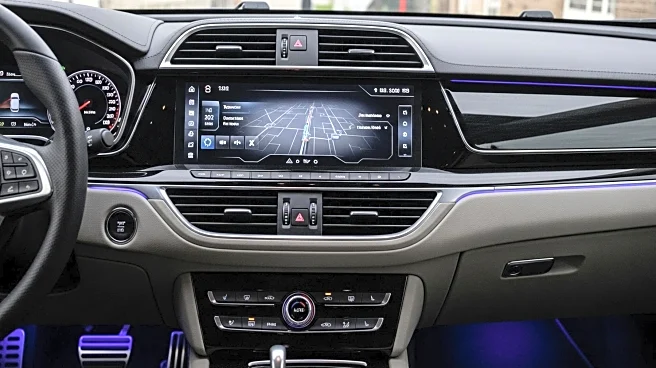What's Happening?
BMW has raised questions about the popularity of Apple CarPlay's navigation system among its vehicle users. Stephan Durach, BMW's Senior Vice President of UI/UX Development, revealed that internal data from over 10 million vehicles indicates that drivers prefer BMW's built-in navigation system over Apple Maps via CarPlay. Despite the widespread belief that CarPlay is a dominant choice for navigation, BMW's findings suggest otherwise. The automaker has noted that while many users keep Apple CarPlay enabled, they often switch to BMW's iDrive system for navigation purposes. BMW's stance aligns with other automakers like Audi, Mercedes-Benz, Polestar, and Volvo, which have also moved away from supporting Apple CarPlay Ultra and third-party navigation apps like Google Maps or Waze.
Why It's Important?
The revelation from BMW challenges the perceived necessity of smartphone mirroring features like Apple CarPlay in modern vehicles. This could influence future decisions by automakers regarding the integration of such technologies in their infotainment systems. If more manufacturers follow BMW's lead, it could impact consumer expectations and the competitive landscape of in-car technology offerings. The preference for built-in navigation systems over third-party apps may also affect the development and marketing strategies of tech companies like Apple and Google, who have invested heavily in automotive integration.
What's Next?
BMW's decision to focus on its iDrive system and Panoramic Display without supporting third-party navigation apps may lead to further innovations in its proprietary technology. Other automakers might reassess their strategies regarding smartphone integration, potentially leading to a shift in industry standards. Consumers may need to adapt to these changes, influencing their purchasing decisions based on the availability and functionality of in-car technology.
Beyond the Headlines
The move by BMW and other automakers to limit third-party app support raises questions about data privacy and control. By encouraging the use of built-in systems, manufacturers retain more control over user data, which could have implications for consumer privacy and data security. Additionally, this trend may spark discussions about the balance between convenience and privacy in the digital age.








